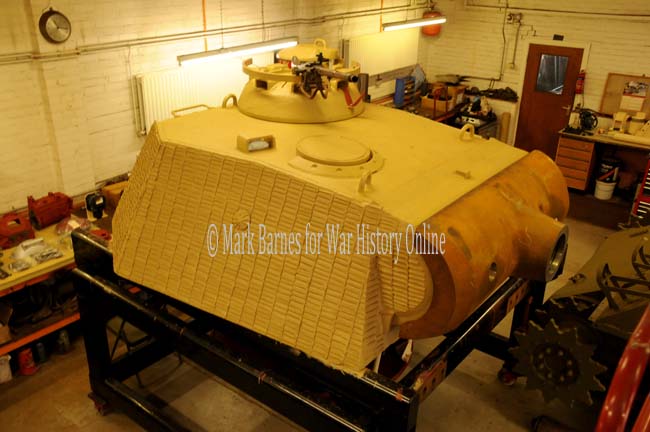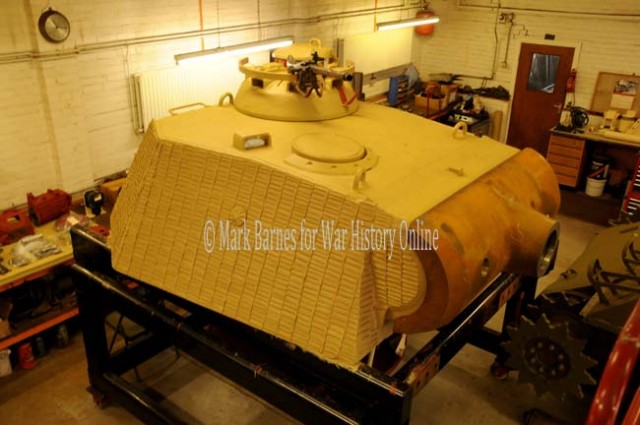We were delighted to be invited by the Wheatcroft Collection to attend the Engine Start-Up day when the Maybach power unit to be fitted into the collection’s early A type Demag Panther was given a run for the benefit of a group of guests. On our way up to Leicestershire we stopped off at the English Civil War battlefield of Naseby where Oliver Cromwell’s cavalry brought about victory for Parliament in 1645. You could not get a greater contrast with the war machine we saw the next day.
We took the opportunity to have a close look at the progress of the restoration project and, as you can see from the images, things are progressing beautifully after many years of dedicated hard work by the restoration team. The Panther makes for a stunning sight, even from the within the confines of a workshop, and on completion it will truly be something to behold. The standard of the work lives up to all we have learned to appreciate from Kevin Wheatcroft and his team.
The tank’s empty engine bay serves to illustrate the difficulties the design presented for operation and maintenance. You really do wonder how they fitted all the essentials in. It was interesting to hear just how many of the components of the tank are unique to it and how the failure to achieve greater standardisation of elements of tank design had a serious impact on Nazi Germany’s production program. It seems simplistic, but the rivalries between designers, manufacturers and branches of the Nazi regime conspired to create a limited range of over-engineered Rolls-Royces rather than a solid fleet of Fords. The contrast with the Sherman and the T34, although often used, really comes into focus when you see a Panther in more detail. It is jaw dropping.
The restored turret is equally impressive and is progressing towards fruition. The interior looks beautiful and the net result should be exceptional once the hull and turret are married up at some point in the future.
The work that has gone into this project is immense. The attention to detail is exceptional; especially when you consider so much of it will be permanently hidden from view. This is the essence of the very best conservation work.
The engine start-up event was a lively occasion and we had fun filming the sights and sounds on our phones while exchanging banter with the caterers who provided a very welcome buffet for us all. The weather had it’s moments as sunshine gave way to spots of hail. Let’s not be too lofty about it – we are enthusiasts and we had a good crack, but it was a very serious occasion at a crucial point in a project which has taken so much commitment from the restoration team. In a brief address, Kevin Wheatcroft took time to thank all the people who have led the project to this point. Cheers to them!
The restored Maybach engine is a thing of beauty. The amount of work needed to rebuild it, which entailed restoring original parts and manufacturing new components is quite amazing. Great efforts have been made to track down original manufacturers to see whether they could produce components or have details on the originals. The engineers themselves seemed almost indifferent to the attention their work received from us visitors. It’s all in a days work.
The facility is an amazing place with many future projects under wraps. There are literally piles of components from wheels to tracks and big bits of metal stacked here and there, giving some of the place the feel of an ever so slightly surreal garden centre. We could have spent ages trying to identify all the stuff but we did have to go home at some point! As days go this one was truly memorable.
We wish to thank Kevin Wheatcroft and his team for their hospitality and hope we can bring you further news on the Panther’s progress in the future.
~By Mark Barnes for War History Online

